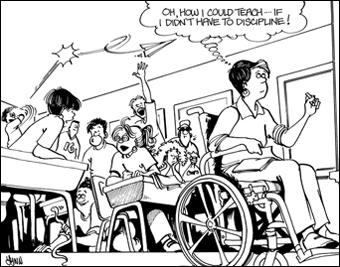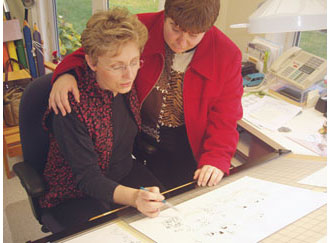

I have always wanted to explore the word of a Special Needs student. In early grade school, we shared our playground with Down Syndrome kids and others with Special Needs. Because we all used the swings together, we weren't afraid of our unique playmates. We weren't afraid to joke with them, play with them, tease them, and be teased. It was a healthy and helpful environment for all of us.
Later, we went to junior high school, where intellectually challenged students were not in attendance. Some of the mainstream kids had suffered polio, or had other chronic physical concerns, so leg braces, crutches and wheelchairs were part of our environment. Again, because we knew these students well, their methods of getting around were familiar. We helped whenever our help was required, otherwise our friends in chairs were the same as anyone else.
Later, in high school, we saw very few people with wheelchairs or crutches and were completely segregated from students with Special Needs. Like everyone else going through puberty, with popularity contests and struggling for a sense of self, I lost my open mind. I lost my ability to see the person and not the wheelchair. I lost my ability to see past a mental challenge and see the spirit inside.
Putting Special Needs Characters into FBorFW
Because I have now had the privilege of knowing some very objective and understanding people, who have taken the time to teach me something about blindness, deafness, the loss of sensation in their limbs, I've had the courage (for the lack of a better word) to include, in For Better or For Worse, one teacher whose wheelchair took her to marathons—and now a Special Needs student with a mind filled with imagination, compassion, and humor.
Meet Miss Edwards
Sharon Edwards: The character Sharon Edwards, who taught Elizabeth Patterson that it's OK to be different, was based on a woman I met in Ohio. It was a luncheon, and people were busily taking their places at nicely decorated tables. At one table, a woman in a wheelchair sat alone. Knowing few of the attendees, I asked if I could sit on the chair next to her and she replied, "Of course!" Then, she looked at me and smiled. "I always wonder who's going to choose to sit next to me at these things," she said, "this means you saw ME and not my wheelchair."

She was right—but of course I saw the wheelchair too, and she was eager to tell me how it worked, how the world looked from a seated position and that the chair was part of her physical person. "When someone leans on my chair it's as though they're leaning on ME!" she laughed. "My neck is geared to looking up—so the people who sit down to talk to me make a very personal and considerate gesture." She told me about access issues and relationships and invited me to attend a conference in Toronto, which would focus on equality everywhere; from sidewalks to the workplace. I went. It was an eye opener. It was the 1980s, and I never realized how society had happily designed everything for the able bodied, segregating those with physical disabilities to just certain restaurants, shops and offices.
Finding Awareness
I found myself talking directly to people in wheelchairs and on crutches; forgetting the machinery, and focusing on the people themselves. It was something I had not been able to do since junior high school, when the kids who'd had polio were just part of the crowd. I don't remember the name of the woman I met in Ohio. We've lost touch, but the lessons I learned from her, and others I've met since, have given me understanding, acceptance, and the awareness to focus on the most important thing we have, which is our ability to communicate. Communication without judgment is a skill to be practiced and preserved. It's not easy.
Adding Shannon to the Strip

Lynn and Stephanie both worked on developing Shannon's character. Stephanie provided many pages of background material on Shannon's likes, dislikes and experiences.
About Stephanie: My niece, Stephanie, has given me the courage—again—to introduce an outstanding character to the strip. Every family, every community, everyone everywhere knows someone with a disability. Without a role model to work with, I was uncomfortable telling a story like Shannon's. Now, with Stephanie's help, I feel I've been given permission in a small way to explore this world. My conversations with Stephanie have been honest, funny, revealing, and educational. She's answered questions I would have been otherwise afraid to ask. She's told me more than I could have expected, and it's with great pleasure that she and I have collaborated to bring Shannon into For Better or For Worse.


